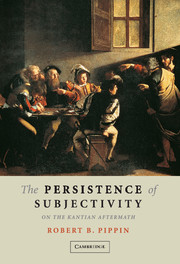Book contents
- Frontmatter
- Contents
- Acknowledgments
- The Persistence of Subjectivity
- 1 Introduction: “Bourgeois Philosophy” and the Problem of the Subject
- PART I SETTING
- PART II THEORISTS
- 3 Necessary Conditions for the Possibility of What Isn't: Heidegger on Failed Meaning
- 4 Gadamer's Hegel: Subjectivity and Reflection
- 5 Negative Ethics: Adorno on the Falseness of Bourgeois Life
- 6 The Unavailability of the Ordinary: Strauss on the Philosophical Fate of Modernity
- 7 Hannah Arendt and the Bourgeois Origins of Totalitarian Evil
- 8 On Not Being a Neo-Structuralist: Remarks on Manfred Frank and Romantic Subjectivity
- 9 Leaving Nature Behind, or Two Cheers for Subjectivism: On John McDowell
- Postscript: On McDowell's Response to “Leaving Nature Behind”
- PART III MODERN MORES
- PART IV EXPRESSION
- Bibliography
- Name Index
- Subject Index
5 - Negative Ethics: Adorno on the Falseness of Bourgeois Life
Published online by Cambridge University Press: 05 June 2012
- Frontmatter
- Contents
- Acknowledgments
- The Persistence of Subjectivity
- 1 Introduction: “Bourgeois Philosophy” and the Problem of the Subject
- PART I SETTING
- PART II THEORISTS
- 3 Necessary Conditions for the Possibility of What Isn't: Heidegger on Failed Meaning
- 4 Gadamer's Hegel: Subjectivity and Reflection
- 5 Negative Ethics: Adorno on the Falseness of Bourgeois Life
- 6 The Unavailability of the Ordinary: Strauss on the Philosophical Fate of Modernity
- 7 Hannah Arendt and the Bourgeois Origins of Totalitarian Evil
- 8 On Not Being a Neo-Structuralist: Remarks on Manfred Frank and Romantic Subjectivity
- 9 Leaving Nature Behind, or Two Cheers for Subjectivism: On John McDowell
- Postscript: On McDowell's Response to “Leaving Nature Behind”
- PART III MODERN MORES
- PART IV EXPRESSION
- Bibliography
- Name Index
- Subject Index
Summary
“Wrong life cannot be lived rightly” (“Es gibt kein richtiges Leben im falschen,” MM, §18, 43; 39), wrote Adorno in a famous passage at the beginning of Minima moralia. It is surprising enough to hear that what is wrong with modern life is that it is “false.” But Adorno is willing to go even further: “Our perspective of life has passed into an ideology which conceals the fact that there is life no longer” (MM, 13; 15; my emphasis). This air of paradox is only intensified by the epigram for the book, taken from the Austrian writer Ferdinand Kürnberger: “Life does not live” (MM, 20; 19). Such an evaluation is not unprecedented, although one sees it mostly in modernist literary contexts. T. S. Eliot in The Wasteland had compared modern officeworkers crossing London Bridge with the dead as described in Dante's Inferno (“I had not thought death had undone so many”), and the accusation (that we have become the living dead) is prominent in Orwell, Lawrence, Nietzsche (of course), and many other modernists. It is, though, philosophically surprising.
It contains an echo of the controversial Aristotelian claim that one can be truly virtuous only in a good polis, a claim reanimated in the nineteenth century by Hegel and his theory of Sittlichkeit. Such a claim already violates modern intuitions about the self-sufficiency of moral individuals and the possibility of moral heroism.
- Type
- Chapter
- Information
- The Persistence of SubjectivityOn the Kantian Aftermath, pp. 98 - 120Publisher: Cambridge University PressPrint publication year: 2005
- 2
- Cited by



